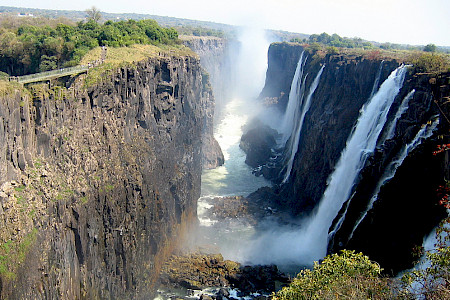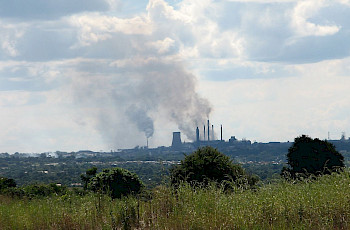Zambia (/ˈzæmbiə/), officially the Republic of Zambia, is a landlocked country in south-central Africa[8] (although some sources consider it part of East Africa[9]). Its neighbors are the Democratic Republic of the Congo to the north, Tanzania to the north-east, Malawi to the east, Mozambique to the southeast, Zimbabwe and Botswana to the south, Namibia to the southwest, and Angola to the west. The capital city is Lusaka, located in the south-central part of Zambia. The population is concentrated mainly around Lusaka in the south and the Copperbelt Province to the northwest, the core economic hubs of the country.
Originally inhabited by Khoisan peoples, the region was affected by the Bantu expansion of the thirteenth century. Following European explorers in the eighteenth century, the British colonised the region into the British protectorates of Barotziland-North-Western Rhodesia and North-Eastern Rhodesia towards the end of the nineteenth century. These were merged in 1911 to form Northern Rhodesia. For most of the colonial period, Zambia was governed by an administration appointed from London with the advice of the British South Africa Company. 
On 24 October 1964, Zambia became independent of the United Kingdom and prime minister Kenneth Kaunda became the inaugural president. Kaunda's socialist United National Independence Party (UNIP) maintained power from 1964 until 1991. Kaunda played a key role in regional diplomacy, cooperating closely with the United States in search of solutions to conflicts in Rhodesia (Zimbabwe), Angola, and Namibia.[10] From 1972 to 1991 Zambia was a one-party state with the UNIP as the sole legal political party under the motto "One Zambia, One Nation". Kaunda was succeeded by Frederick Chiluba of the social-democratic Movement for Multi-Party Democracy in 1991, beginning a period of social-economic growth and government decentralisation. Levy Mwanawasa, Chiluba's chosen successor, presided over Zambia from January 2002 until his death in August 2008, and is credited with campaigns to reduce corruption and increase the standard of living. After Mwanawasa's death, Rupiah Banda presided as Acting President before being elected President in 2008. Holding office for only three years, Banda stepped down after his defeat in the 2011 elections by Patriotic Front party leader Michael Sata. Sata died on 28 October 2014, making him the second Zambian president to die in office.[11] Guy Scott served briefly as interim president until new elections were held on 20 January 2015,[12] in which Edgar Lungu was elected as the sixth President.
In 2010, the World Bank named Zambia one of the world's fastest economically reformed countries.[13] The Common Market for Eastern and Southern Africa (COMESA) is headquartered in Lusaka.
Project: Make Zambia Clean, Green and Healthy
Led by Mr Simwanza, the principal inspector of the department of operations of Zambia Environmental Management Agency. This is a program that was started in 2007 and re-launched in April 2018 by the Republican President. The program is multi-sectoral, where stakeholders including the general public are encouraged to actively participate in the implementation of the wide range of related activities to promoting environmental and public health.
Since the commencement of the program, the following achievements have been attained:
- Enhanced Private sector participation in waste management
- Increased public awareness on waste management
- Reduced indiscriminate dumping of waste in places like storm drains.
